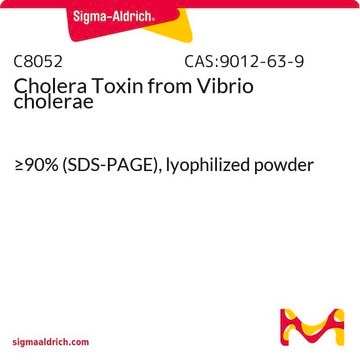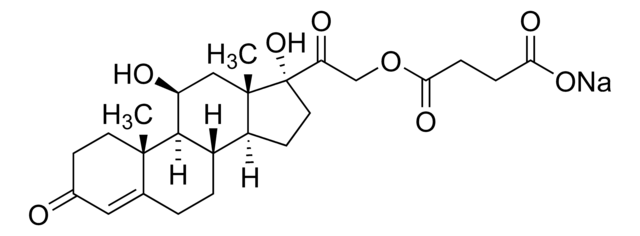H4001
Hydrocortisone
≥98% (HPLC)
Synonym(s):
11β,17α,21-Trihydroxypregn-4-ene-3,20-dione, 17-Hydroxycorticosterone, 4-Pregnene-11β,17α,21-triol-3,20-dione, Cortisol, Kendall’s compound F, Reichstein’s substance M
About This Item
Recommended Products
biological source
synthetic (organic)
sterility
non-sterile
Assay
≥98% (HPLC)
form
powder
mp
211-214 °C (lit.)
solubility
water: 0.28 g/L at 25 °C
application(s)
cell analysis
shipped in
ambient
storage temp.
room temp
SMILES string
[H][C@@]12CCC3=CC(=O)CC[C@]3(C)[C@@]1([H])[C@@H](O)C[C@@]4(C)[C@@]2([H])CC[C@]4(O)C(=O)CO
InChI
1S/C21H30O5/c1-19-7-5-13(23)9-12(19)3-4-14-15-6-8-21(26,17(25)11-22)20(15,2)10-16(24)18(14)19/h9,14-16,18,22,24,26H,3-8,10-11H2,1-2H3/t14-,15-,16-,18+,19-,20-,21-/m0/s1
InChI key
JYGXADMDTFJGBT-VWUMJDOOSA-N
Gene Information
human ... ABCB1(5243) , CYP3A4(1576) , NR3C1(2908) , SERPINA6(866)
mouse ... Abcb1a(18671) , Abcb1b(18669) , Ifng(15978) , Nos2(18126)
rat ... Ar(24208) , Nr3c1(24413)
Looking for similar products? Visit Product Comparison Guide
Biochem/physiol Actions
Features and Benefits
Signal Word
Danger
Hazard Statements
Precautionary Statements
Hazard Classifications
Repr. 1A - STOT RE 2
Storage Class Code
6.1C - Combustible acute toxic Cat.3 / toxic compounds or compounds which causing chronic effects
WGK
WGK 2
Flash Point(F)
Not applicable
Flash Point(C)
Not applicable
Personal Protective Equipment
Certificates of Analysis (COA)
Search for Certificates of Analysis (COA) by entering the products Lot/Batch Number. Lot and Batch Numbers can be found on a product’s label following the words ‘Lot’ or ‘Batch’.
Already Own This Product?
Find documentation for the products that you have recently purchased in the Document Library.
Customers Also Viewed
Our team of scientists has experience in all areas of research including Life Science, Material Science, Chemical Synthesis, Chromatography, Analytical and many others.
Contact Technical Service







